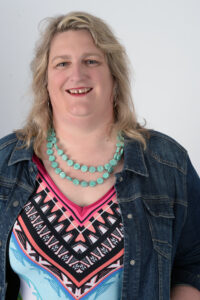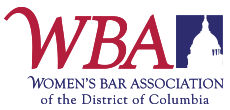
WBA celebrates Pride Month by celebrating the LGBTQ+ members of our community.
Ava Benach is a founding partner of Benach Collopy LLP. Ava has practiced law for close to 25 years. She told us: “I know I look much too young- and have done nothing but immigration. I love people and getting to know about their lives and experience and I get some outstanding stories in my job. I have worked in small firms and AmLaw 100 firms, but having my own firm feels like my own political and artistic statement where I get to create the type of place I want to exist in the world.”
If Ava wasn’t “immigration lawyering”, she would be coaching baseball to kids. “I coached for years in our local Little League and was one of the founders of DC Girls Baseball, an organization dedicated to supporting and promoting girls in baseball. We have grown to be one of the largest and most successful girls baseball organizations in the country.”
Ava tell us that she has been married for 24 years to a woman whose fierce love for her keeps her sustained every day. She has three kids- Paloma, 19, Alex, 17, and Teddy, 15. “They are the best people in the world and they make me laugh every day.” Ava also has a shih tzu puppy named Reggie Jackson. “He hangs out with me early in the morning while I am the only one up and drinking my coffee. When he hears another person’s door open upstairs, he climbs up my body and licks my face to tell me someone else is coming down. Then he waits there until the next riser is visible and leaves me to greet them.”
Ava is also involved in the American Immigration Lawyers Association, Jackson Reed Baseball Boosters, and the National Immigration Project of the National Lawyers Guild.
How did your community growing up shape who you are now?
My community was diverse. We were Cubans living next door to Greeks, who lived next door to Irish people. A family of French speaking Africans lived across the street and Holocaust survivors were a few houses down. I was always quite comfortable with immigrants and did not realize that the whole country was not this way. I was surrounded by immigrants in my family and on my block. It all felt very normal to me and I was shocked by anti-immigrant sentiment in the wider country.
What motivated you to enroll in law school?
I have always been interested in topics of public debate. Law is where issues of society, economics, and relationships get resolved, often imperfectly. I like discussing meaningful issues and there is almost nothing that does not eventually come within the law’s domain.
My grandparents and grand uncle were lawyers in Cuba. My grandmother got her law degree in Havana in 1941, thirty years before women regularly received law degrees in the U.S. It skipped a generation as my parents are scientists. But it feels like it is in my blood.
What advice would you give to an LGBTQ+ law student who aspires to be where you are now?
There is nothing more powerful than living authentically. A person who boldly and openly proclaims their identity even when it may be against their interest is unbeatable. There is nothing that inspires confidence in clients so much as a lawyer who fights for who they are. Clients want to know that you are the best person for the job and your bold embrace of yourself tells clients that you are willing to fight for them.
What does Pride Month mean to you personally, and why is it important to celebrate it?
It means community. It is a feeling of warmth and celebration. It is about people celebrating who they are in a world that is often hostile to them. Especially now. It is so easy to grow despondent by the backsliding of LGBTQ and women’s rights. Pride reminds us that we are a talented, living and resilient community and this too shall pass.
What progress or positive changes have you witnessed for the LGBTQ+ community in recent years?
In my immediate community, the positive change I see is that LGBTQ+ identity is hardly remarked upon. I see the next generation wondering what all the fuss over sexual orientation and gender identity is all about. I see the next generation confronting these issues head on in a way that is unimaginable to teen me and it gives me so much hope.
What are your hopes or aspirations for the future of the LGBTQ+ community?
My hope is that gender identity and sexual orientation becomes just one more interesting facet in the entire landscape that is an individual and that none of us are defined by limitations. I don’t want to be the “trans lawyer.” I want to be a lawyer and the person people want to handle their case. I want my life defined by more than being transgender.
What inspired you to join the WBA?
I love joining women’s groups. It is easily my favorite thing. I find a depth of connection and purpose I never experienced and a warmth and camaraderie that does not exist in other groups in my experience. The relationships I have made with other women are the most valuable ones in my life.
Do you have a mentor/hero?
My grandmother came to this country in 1959 as basically a single mother to two teenage boys, with an ailing mother of her own as well as a brother with serious cardiac issues. She left a comfortable life in Cuba and had to reinvent herself in America. She went from being a lawyer in Cuba to teaching Spanish, first at Berlitz and then a high school, all the while carrying multiple people on her back. Her strength and indomitability inspire me every day.
What is the best advice you have received?
Be willing to make an ass out of yourself sometimes. For example, when learning a new language, use it all the time around native speakers. It is a guaranteed way to improve, and people appreciate it. The only way you get better at anything is by trial and error, so, to become competent or expert, you must be willing to fall on your face.
